Japan CSP
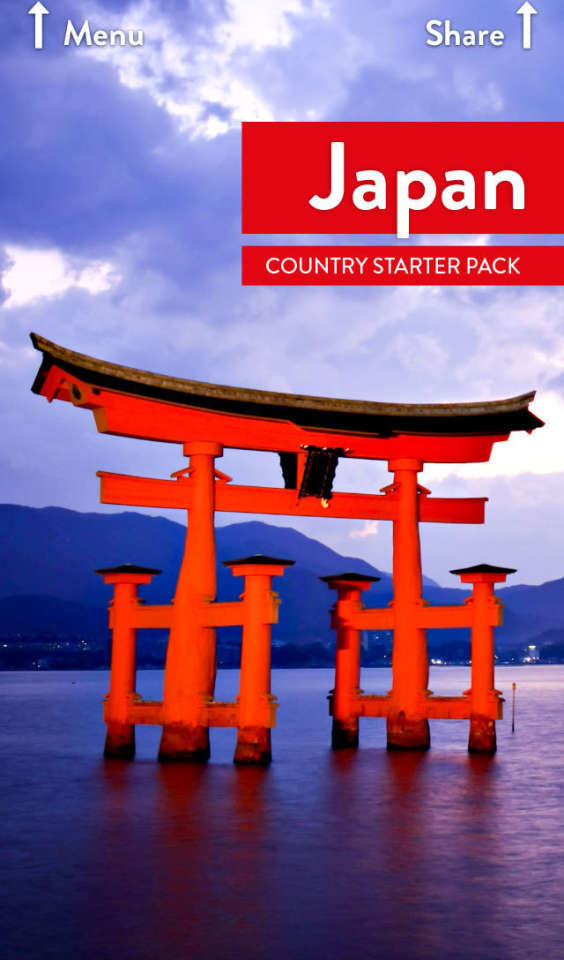
Provide Feedback
CloseShare With Contacts
CloseShare With Contacts
CloseCopy Link
Closehttps://japancsp.shareableapps.com/
Tap and hold link above to copy to clipboard.
Delete Message?
Are you sure you want to delete this message?
An update is now available for this app!

You successfully shared the app
https://japancsp.shareableapps.com/
Tap and hold link above to copy to clipboard.
Are you sure you want to delete this message?
You successfully shared the app
https://japancsp.shareableapps.com/
Tap and hold link above to copy to clipboard.
Are you sure you want to delete this message?
Japan is one of the world's economic giants, a modern and sophisticated powerhouse that ranks behind only China and the United States in global economic rankings.
Since the early 1990s, Japan's wings have been clipped, its economic progress held back by fallout from a speculative boom and bust in property and equity markets, as well as increased competition from other rising Asian powers. Yet, Japan remains an immensely powerful force in world trade and commerce, and a key business partner for Australia. Japan is our second-largest export market, behind China, and our third-largest source of foreign investment. Importantly, bold reforms being implemented by the Japanese Government are set to open up new opportunities for Australian businesses. Consider some of the key features of Japan that can make it attractive for Australian businesses:
Australia and Japan have enjoyed a strong and complementary trading relationship since the early 1960s. Australia's major exports of natural resources such as coal, iron ore and liquefied natural gas have fuelled Japan's manufacturing sector. Australian agricultural products such as beef and fresh seafood have also been important contributors to the relationship.
In turn, Japan has been a major supplier to Australia of manufactured goods including cars, electronic equipment and steel, as well as a primary source of tourists. Japan has also invested heavily in Australia over several decades, with its total stock of investment worth just under AUD 200 billion in 2015. Total Australian investment in Japan in 2015 was worth just over AUD 90 billion.
Resources, agricultural products and manufactured goods that dominate the trading relationship, with trade in goods worth more than AUD 55 billion in 2015-16. Two-way services trade in 2015-16 was worth a relatively modest AUD 5.2 billion, with travel and transport the major contributors. However, trade in services could expand considerably after the signing of a free trade agreement – the Japan Australia Economic Partnership Agreement (JAEPA) (See 1.3: The Bilateral Relationship for more details).
From an Australian business perspective, Japan is quite different to other Asian countries in that the opportunities are not due to a rapidly rising GDP and expanding middle class. Its economy is developed and mature, and its middle class well established. Opportunities are to be found in discovering new niches in a changing and increasingly open economy with an established cohort of middle-class consumers. Specific industries and products Australian businesses enjoy advantages in include:
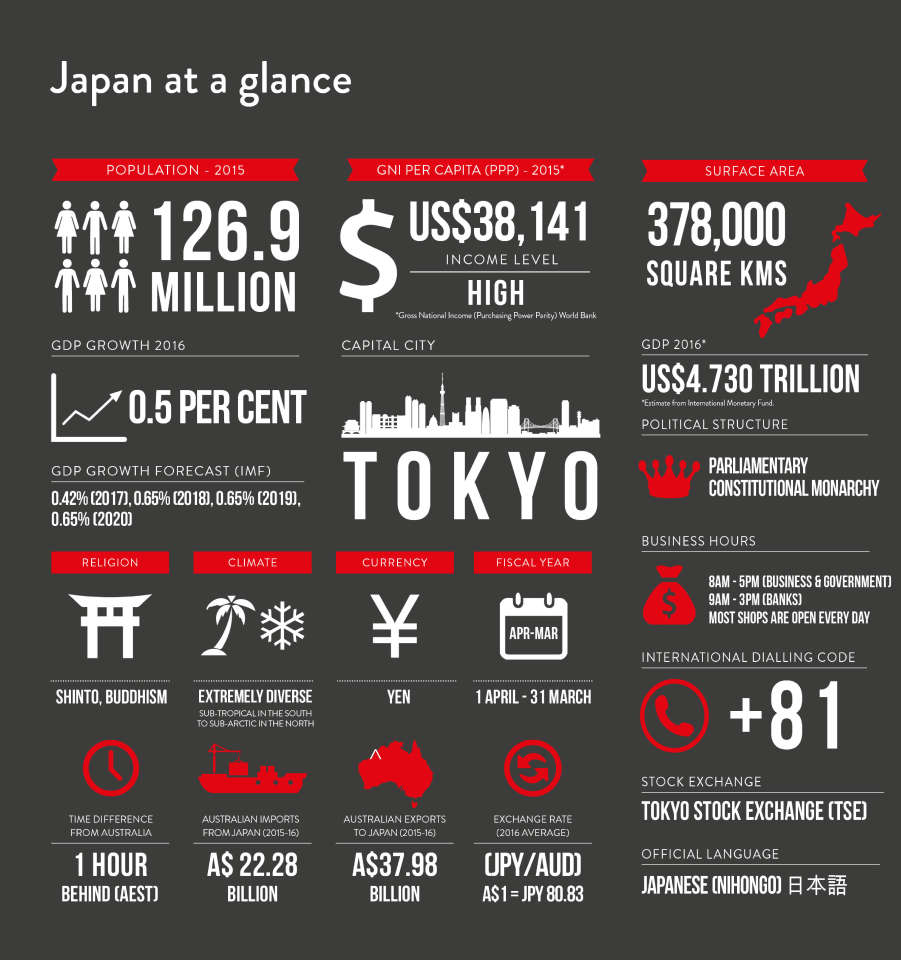
For more information, access the full Japan Country Starter Pack
You successfully shared the app
https://japancsp.shareableapps.com/
Tap and hold link above to copy to clipboard.
Are you sure you want to delete this message?
Japan is made up of more than 6000 islands, covering around 378,000 square kilometres. The four largest islands are Honshu, Hokkaido, Kyushu and Shikoku. It is highly mountainous, with only about 15 per cent of the land area level enough for agriculture.
The climate is extremely diverse, from sub-arctic in the north to sub-tropical in the south, though most of the country has a temperate climate with four seasons.
When Emperor Meiji moved his government from Kyoto to Tokyo in 1868 he set Japan on a course of modernisation that would transform it from a feudal society to a powerful industrialised nation in just a few decades, and a military power in Asia.
In 1941, Japan launched the Pacific War with attacks on Pearl Harbour and Western colonies in Southeast Asia. Initial vast gains were eventually lost, and the war ended with the dropping of atomic bombs on Hiroshima and Nagasaki in 1945.
The Allies occupied Japan at the end of the war and set about reshaping the nation. A new constitution strengthened democratic institutions and renounced war. The occupation ended in 1952, setting the scene for Japan's extraordinary rise as a peacetime global power.
Japan's unique culture has been shaped by trends and forces from within and outside the country. An understanding of these and how they have shaped Japanese society will help you in your dealings with Japanese people, businesses and society.
Japan is a racially homogeneous society, with 98.5 per cent of people identifying as ethnic Japanese. Korean (0.5 per cent) and Chinese (0.4 per cent) make up the largest minorities.
Japan is well known for its rules and etiquette. This has been attributed to its long isolation and feudal class structure remaining in place into the 19th century. Following the correct rules and etiquette not only shows maturity and gives 'face', it also promotes harmony, a key tenet in Confucianism, Buddhism and Shintoism, the three traditions that have existed side-by-side in Japan for centuries.
Japan is a democratic, constitutional monarchy with a parliamentary government headed by a Prime Minister, currently Shinzo Abe. Japan maintains an Imperial Family, headed by the Emperor, currently Emperor Akihito.
Japan's parliament, often referred to as the 'Diet' in English, comprises a House of Representatives (lower house) and a House of Councillors (upper house). Prefectural and local government make up the country's second and third tiers of government.
Japan is one of the largest and most developed economies in the world. It has a well-educated, industrious workforce and its large, affluent population makes it one of the world's biggest consumer markets. Its gross domestic product (GDP) in 2016 was estimated to be USD 4.7 trillion, and its population of 126.9 million enjoys a high standard of living, with per capita GDP of just below USD 40,000 in 2015. Japan was one of the first Asian countries to climb the value chain from cheap textiles to advanced manufacturing and services.
Japan has excellent infrastructure, particularly its modern and extensive rail and road networks spread throughout the country. Japan's rail network is ranked number one internationally by the World Economic Forum, while its roads, sea ports and airports are all ranked in the top 30. Rail is the dominant form of passenger transport, and trucks and ships carry the majority of freight. There are also extensive passenger airline networks between cities.
Japan has one of the most advanced and extensive communications networks in the world, with high-grade mobile and fixed-line phone and broadband internet systems serving the major popular centres throughout the country.
For more information, access the full Japan Country Starter Pack
You successfully shared the app
https://japancsp.shareableapps.com/
Tap and hold link above to copy to clipboard.
Are you sure you want to delete this message?
Japan looms large among a handful of Australia's most important international partners. The Japan-Australia relationship is long-standing, massively rewarding economically (for both), ever-widening and increasingly close politically. The biggest change in the relationship in many years came in 2014 with the signing of a historic free trade pact – the Japan Australia Economic Partnership Agreement (JAEPA).
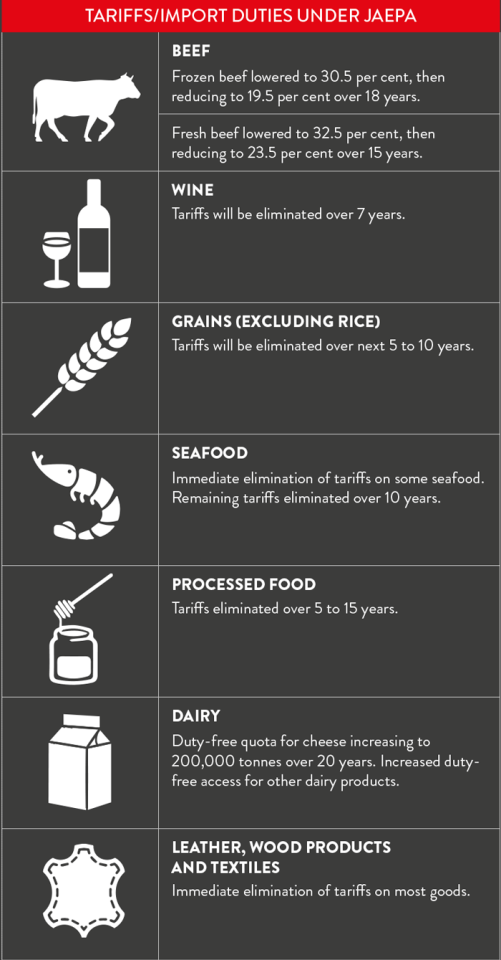
The agreement with Japan came into force in January 2015 and will deliver significant benefits to Australian farmers, manufacturers, exporters, service providers and consumers by bringing down barriers to the Japanese market.
Specifically, under JAEPA:
For more information, access the full Japan Country Starter Pack
You successfully shared the app
https://japancsp.shareableapps.com/
Tap and hold link above to copy to clipboard.
Are you sure you want to delete this message?

You successfully shared the app
https://japancsp.shareableapps.com/
Tap and hold link above to copy to clipboard.
Are you sure you want to delete this message?
Companies looking to enter the Japanese market for the first time face a number of location options. The choice of place is increasingly about serving specific niches, and thorough research is essential.
Income levels and development are relatively evenly distributed across Japan – it has the fifth-lowest income disparity by region in the OECD. With the economy dominated by services and manufacturing, economic activity is heavily concentrated in Japan's cities. They account for 70 per cent of national GDP generated, the highest in the OECD. Just under 70 per cent of Japan's population is also concentrated in the cities.
See the full version of the Japan Country Starter Pack for more information on specific regions.
Japan has recently created a number of Special Economic Zones to attract foreign investment, increase the competitiveness of its economy and drive reform. Each zone focuses on a different industry or area of reform. If you are looking to invest in Japan, find out what advantages there are for your business in these Special Economic Zones.

Japan is a low-risk destination for doing business compared with most other countries in Asia. The rule of law is well established and contracts are easily enforceable. Nonetheless, your research should include careful assessment of the risks associated with doing business overseas.
Japan's public debt, which stood at 248 per cent of GDP in 2015, has recently resulted in credit rating downgrades from the international ratings agencies. However, Japan's credit rating outlook is now considered 'stable' by the main agencies. At the time of writing, Standard & Poor's credit rating for Japan was AA-, while both Moody's and Fitch's assigned Japan an A rating.
Corruption is minimal in Japan, resulting in a world ranking of 20 out of 176 countries by Transparency International 2016 for control of corruption.
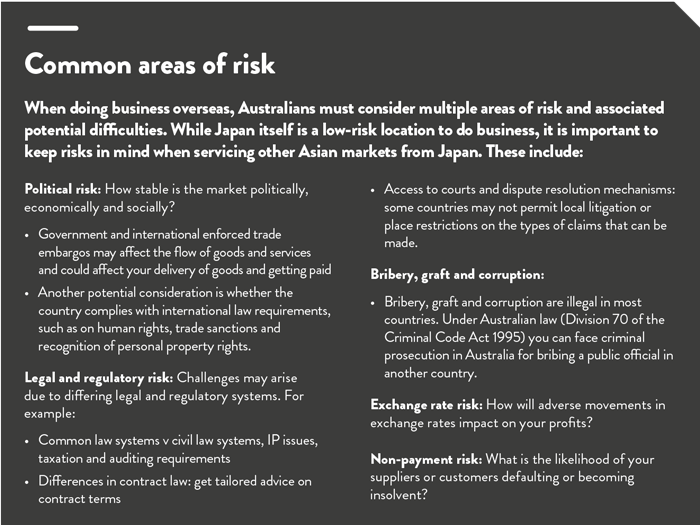
For more information, access the full Japan Country Starter Pack
You successfully shared the app
https://japancsp.shareableapps.com/
Tap and hold link above to copy to clipboard.
Are you sure you want to delete this message?
A variety of research organisations in Japan, including large international professional and accounting firms, can be a valuable source of information for Australian businesses planning to enter the Japanese market. The Australian Government's trade agency, Austrade, which has a significant presence on the ground in Japan, also provides a range of services for Australian firms seeking to enter the market.
The Australian Government's Export Market Development Grant (EMDG) scheme can help meet costs, and state and territory governments may provide grants too.
The Japan External Trade Organisation (JETRO) is a Japanese Government organisation that aims to promote investment and trade in Japan.
www.jetro.go.jp
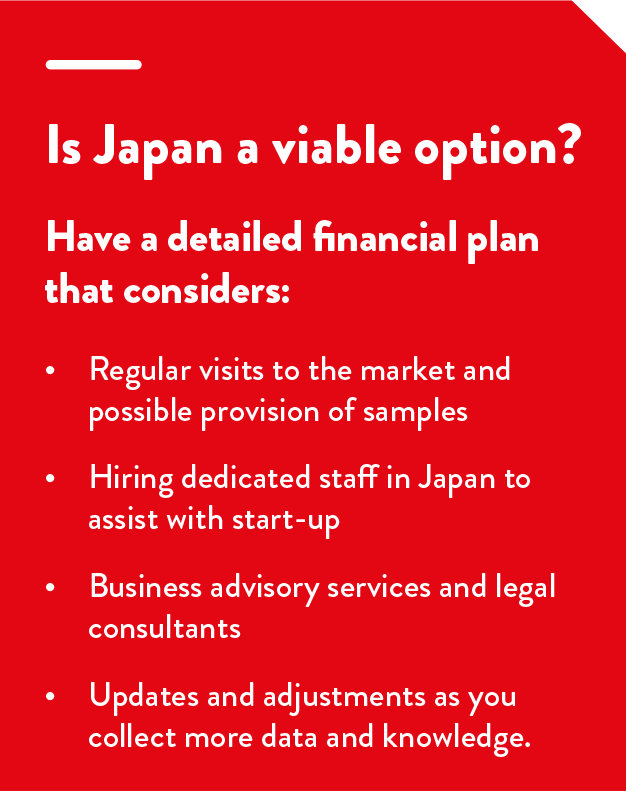
You will need to visit Japan to develop a deeper understanding of your target market and make contacts.
Visit before entering agreements with prospective agents, distributors or other business partners. Consider meeting with several potential partners to give you a basis for comparison. Arrange in-country assistance to help set up your program. This will help you see the right agents and customers who will be briefed and screened for interest and suitability. Numerous trade shows and exhibitions take place in Japan, and can provide an excellent opportunity to meet potential customers.

Don't waste time in Japan doing what you can do in Australia. Various organisations have training courses or seminars that can expand your knowledge about doing business in Japan, including Asialink Business, Austrade, Export Council of Australia (ECA) and state and territory governments.
Prearrange as many of your meetings as possible and reconfirm them a day in advance. Within 48 hours of your appointment, send an email thanking your contact for the meeting and providing any follow-up information.
Joining a business association is a great way to learn more about what is going on in the local business community and to meet colleagues. Try the Australia Japan Business Co-operation Committee (AJBCC) and its Japan-based counterpart, the Japan Australia Business Co-operation Committee (JABCC), or the Australian and New Zealand Chamber of Commerce in Japan (ANZCCJ). See Chapter 7 for contact details.
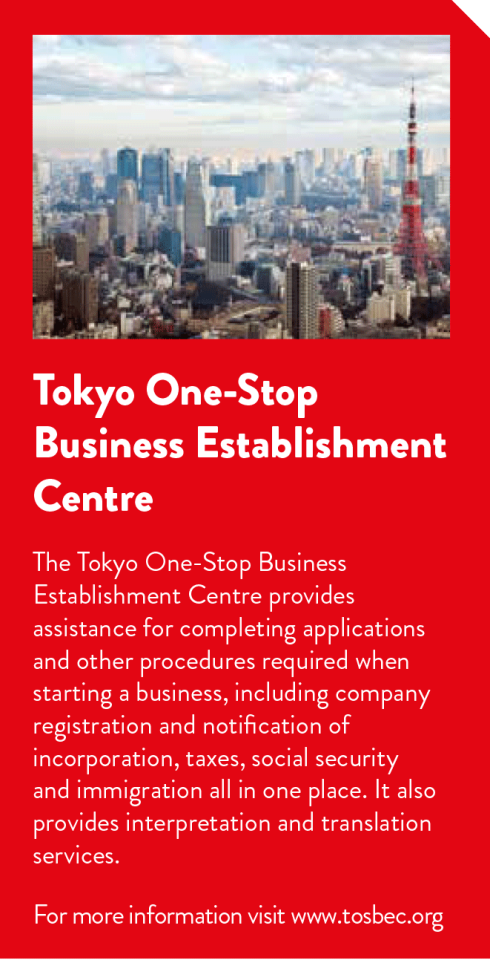
TOSBEC - www.tosbec.org
For more information, access the full Japan Country Starter Pack
You successfully shared the app
https://japancsp.shareableapps.com/
Tap and hold link above to copy to clipboard.
Are you sure you want to delete this message?
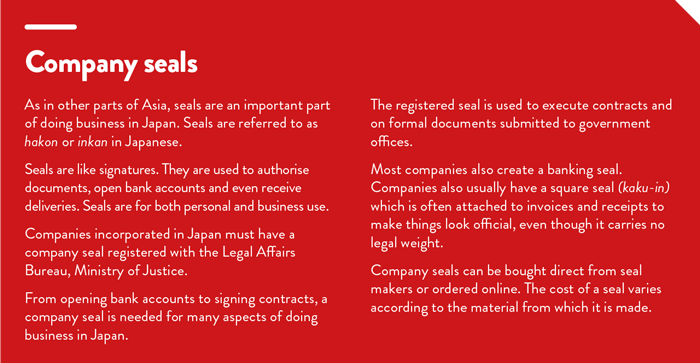
Once you have decided to set up a business in Japan, there are many more issues to consider. What type of business structure will you use? Will you appoint a local agency, open a branch office, or set up a Japanese subsidiary? And what legal and administrative processes must you go through to get established?
There are three primary ways to set up a business in Japan: establish an entity in the form of a subsidiary, as a joint stock company, or a limited liability company. If you do not want to set up a corporate entity, then there are other ways you can sell your product in Japan. See Chapter 3 for more information.
Foreign companies wishing to operate on a continuous basis in Japan must formally register one of the following:
Australian businesses looking to enter the Japanese market can establish the following structures:
GKs are quicker and easier to establish than KKs. GKs offer more flexibility in corporate governance and management decisions, lower annual costs and decreased regulation. KKs are more common, however, as they have a longer history under Japanese corporate law.
Finally, depending on the circumstances, partnerships of different types can be used though they will typically require a KK or GK to be part of the structure as well. Different kinds of partnerships include:
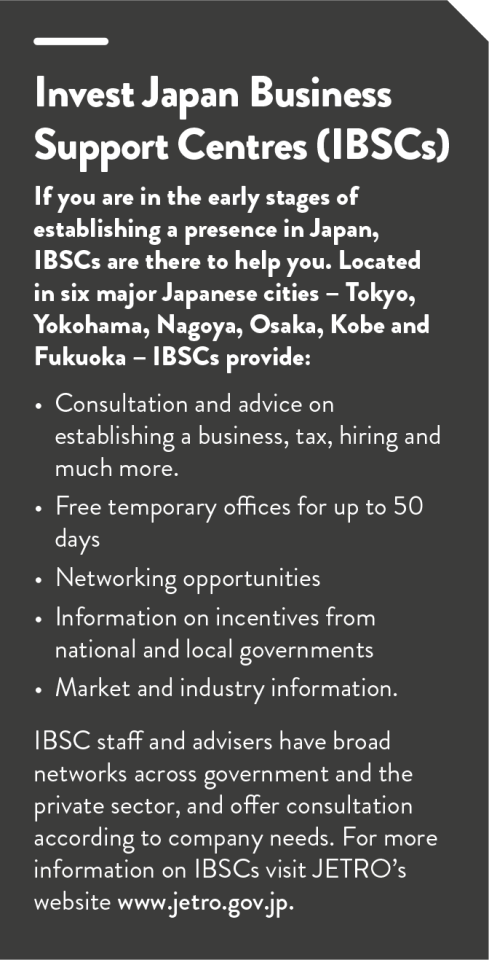
A branch office is the simplest way for a foreign company to begin operations and carry out profit-making activities in Japan. A branch office does not have its own legal corporate status as it is deemed to be part of its parent company. It may, however, open bank accounts, lease real estate in its own name, hire staff and carry out most of the activities of a subsidiary.
Representative offices are a good way to get a feel for the Japanese market without committing too many resources. Representative offices may conduct market surveys, collect information, purchase goods and carry out publicity/advertising activities, but they are not permitted to engage in sales activities.
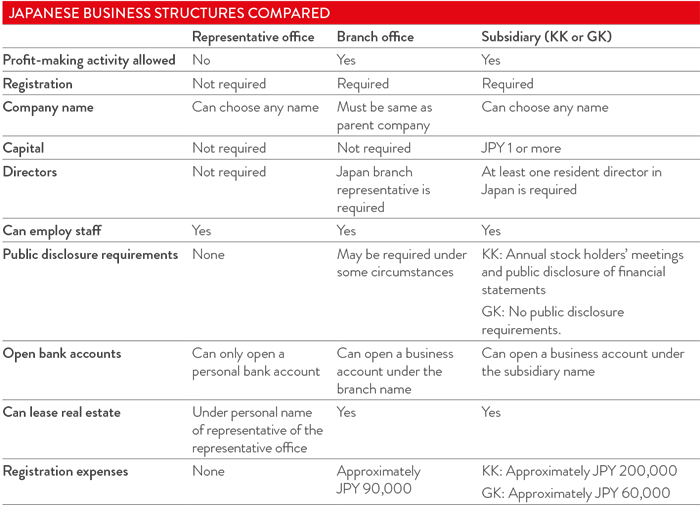
For more information, access the full Japan Country Starter Pack
You successfully shared the app
https://japancsp.shareableapps.com/
Tap and hold link above to copy to clipboard.
Are you sure you want to delete this message?
Japan has a large and highly advanced manufacturing sector. Manufactured goods from Japan enjoy a well-earned reputation for high quality, durability and sophistication. In addition, Japanese manufacturers have extensive global links, especially in Southeast Asia, with many having substantial operations in countries like Thailand.
Japan relies on innovative product design, high quality standards and a world-class manufacturing workforce to remain competitive. An Australian manufacturer looking to develop an innovative product and have it produced to the highest standards may find what they are looking for in Japan.
For more information, access the full Japan Country Starter Pack
You successfully shared the app
https://japancsp.shareableapps.com/
Tap and hold link above to copy to clipboard.
Are you sure you want to delete this message?

You successfully shared the app
https://japancsp.shareableapps.com/
Tap and hold link above to copy to clipboard.
Are you sure you want to delete this message?
Exporting directly, rather than relying on Japanese agents or distributors, is a popular option among Australian firms that sell products in Japan. Exporting directly means involving yourself with every aspect of the export process, including:
Advantages of directly exporting your product include:
The disadvantages of direct exporting include the higher costs you may incur from having to employ a number of in-house staff to cover all the aspects of the export sale process.
For more information, access the full Japan Country Starter Pack
You successfully shared the app
https://japancsp.shareableapps.com/
Tap and hold link above to copy to clipboard.
Are you sure you want to delete this message?
Some Australian firms rely on agents or distributors to represent their businesses and sell their products in Japan. Ensure you have the role of the Japanese party clearly defined in the contract you have with them.
Japanese consumers expect exceedingly high quality and originality in the products they purchase, and most are willing to pay a large premium for this. Research the true value of your product in the Japanese market before you enter into contract negotiations with a distributor. Japanese consumer preferences allow some distributors to charge 50, 100 or even 200 per cent more than the retail price in Australia.
For more information, access the full Japan Country Starter Pack
You successfully shared the app
https://japancsp.shareableapps.com/
Tap and hold link above to copy to clipboard.
Are you sure you want to delete this message?
Japan has one of the highest internet penetration rates in the world, with more than 109 million users, and its online sales growth is strong. It is expected that by 2018, e-commerce sales will grow to AUD 164 billion from AUD 120 billion in 2014. Australian businesses can take advantage of this trend to reach large numbers of Japanese customers, even with a minimal in-country presence.
Japanese consumers still enjoy the experience of shopping in physical retail outlets and tend to prefer malls and stand-alone stores to department stores. Credit card use is also less popular, making online shopping unattractive for some consumers. Overall, however, e-commerce is expected to grow as younger generations of more cost-conscious Japanese consumers emerge.

Credit cards are the most common form of payment online in Japan. Myriad other payment options include the system that allows Japanese consumers to buy an item online, and pay for it at a convenience store. It is critical to offer this option when selling goods online in Japan. You should also make cash on delivery and bank transfer payments available.
For more information, access the full Japan Country Starter Pack
You successfully shared the app
https://japancsp.shareableapps.com/
Tap and hold link above to copy to clipboard.
Are you sure you want to delete this message?
Direct selling – making direct contact with buyers and end users – has declined in Japan in recent years, as new and diverse retail channels have flourished. One area in which direct sales companies offer an advantage is in food and beverage products, given Japanese consumers' concerns over food safety. Direct sales companies with a well-established reputation have an advantage in getting food and beverage imports to a large number of consumers, particularly older Japanese and those living outside of major cities.
For more information, access the full Japan Country Starter Pack
You successfully shared the app
https://japancsp.shareableapps.com/
Tap and hold link above to copy to clipboard.
Are you sure you want to delete this message?
Franchising is popular in Japan, particularly in the food and beverage industries and in retail and business services. Franchise regulations can be complicated, so it is advisable to seek professional legal advice before setting up.
For more information, access the full Japan Country Starter Pack
You successfully shared the app
https://japancsp.shareableapps.com/
Tap and hold link above to copy to clipboard.
Are you sure you want to delete this message?
The best way to deal with the complexities of Japan for marketing and advertising purposes is to invest in and hire local knowledge. Create a comprehensive marketing plan including advertising as well as elements such as your brand identity, stakeholder management, public relations, media (traditional, digital and social), and your product/brand value proposition. You may also need to adapt your product to meet Japanese preferences or requirements.
Cultural considerations: Japanese language, culture and symbolism need to be considered when marketing and advertising in Japan. Critical to your brand's success will be a name and symbols or colours that have no negative connotations in Japanese culture.
Digital v traditional media: Internet and social media marketing have been slower to take off in Japan compared with most other advanced economies, while the popularity of traditional media such as print newspapers and magazines has not declined as rapidly. Consider taking a two-pronged approach to traditional and digital media. Having your marketing material translated into Japanese is essential.
For more information, access the full Japan Country Starter Pack
You successfully shared the app
https://japancsp.shareableapps.com/
Tap and hold link above to copy to clipboard.
Are you sure you want to delete this message?
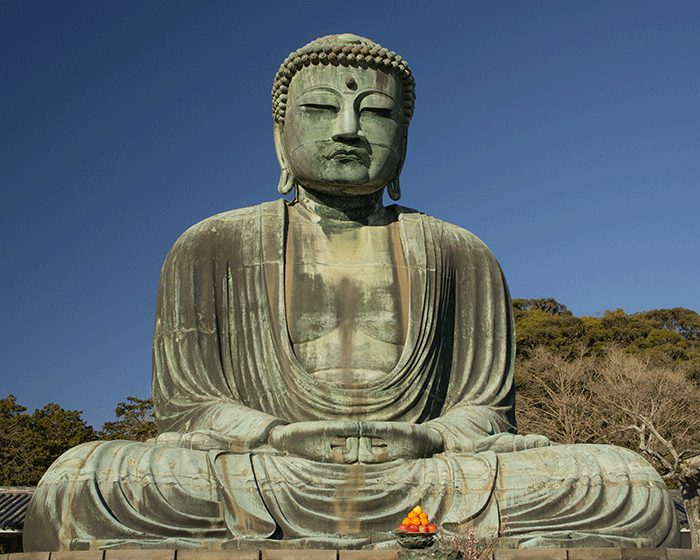
You successfully shared the app
https://japancsp.shareableapps.com/
Tap and hold link above to copy to clipboard.
Are you sure you want to delete this message?
Japanese culture is strongly influenced by Confucianism, which emphasises obedience, authority and age. Shintoism is also deeply ingrained in Japanese culture, and its focus on ritual has a strong impact on Japanese business practices. Conflict avoidance and harmonious relationships are also important, leading to an indirect style of communication that can be unfamiliar to Australian business people.
Age and status: Respect for age and status is very important in Japanese culture, with hierarchy affecting all aspects of social interactions. That said, Japanese decision making can be surprisingly democratic.
Business cards: The exchange of business cards (meishi) is an essential part of initial meetings in Japan and follows a strict protocol. It allows the Japanese to quickly determine their counterpart's all-important position, title and rank. Consider having Japanese translations on one side of your business cards.
Japanese names: Japanese family names come first, and are followed by the given name. It is usual to address someone by their family name followed by the honorific san, Tanaka-san for example. Address people by their family name until you have been invited to call them by their given name.
Bowing and handshakes: Bowing is an important part of everyday life in Japan, including in the business context. Japanese bow to those senior to them both as a greeting and a show of respect, and the bow is returned. For Australian business people, extending a simple handshake when greeting and taking leave is fine.
Modesty: Japanese culture values modesty and humility. Speak in a quiet tone, do not gesticulate too much, and avoid being pushy or talking yourself up.
For more information, access the full Japan Country Starter Pack
You successfully shared the app
https://japancsp.shareableapps.com/
Tap and hold link above to copy to clipboard.
Are you sure you want to delete this message?
The strength of business relationships in Japan can determine many aspects of commercial life, including access to credit, procurement and contracting. Investing in business relationships involves face-to-face time with a person of similar age and status, with a strong emphasis on loyalty and trustworthiness.
Formal introduction: An introduction from an intermediary who is known and trusted by your Japanese counterpart will go a long way towards establishing a positive business relationship.
Building trust: The Japanese place a premium on trust and honesty. They appreciate honest communication and admissions and apologies if you are unable to meet a request.
Be consistent: Consistency in relationships is a key factor in success. Documenting agreements fully and concisely to reflect both parties' needs will help to avoid problems later. Keep Japanese partners informed of key personnel changes.
Socialise with Japanese: Socialising after hours over dinner and drinks is a great way to develop a relationship and make communication more open. Business is unlikely to be discussed at dinner. You are quite likely to end up at a karaoke venue and, as a foreign guest, you will be expected to sing. If you are invited to play golf, this is a positive sign.
Gifts: Gift giving is part of Japanese business culture and is highly ritualised. Wrapping and presentation are possibly more important than the gift itself.
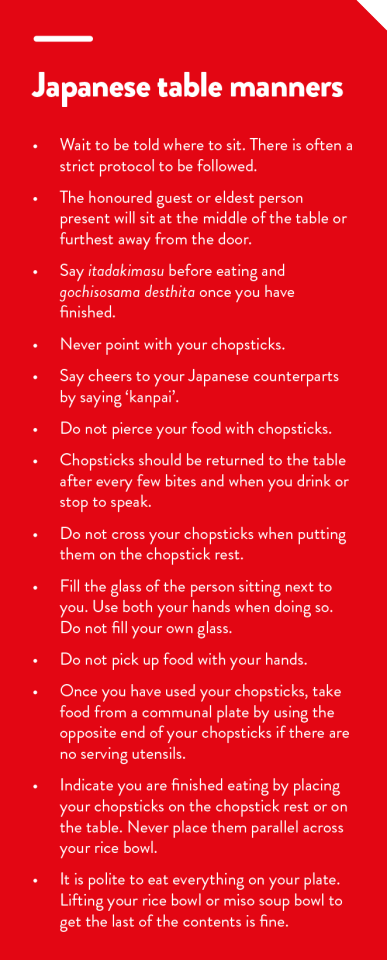
Some government authorities and business groups you may come across when doing business in Japan include:
Responsible for policy and regulatory areas including trade, energy, manufacturing and regional development. Encompasses the Japan Patent Office, and Regional Bureaus of Economy, Trade and Industry.
Website:
www.meti.go.jp
Responsible for tax, budget and fiscal policy. Encompasses Japan Customs and the National Tax Agency.
Website:
www.mof.go.jp
Manages Japan's official relations with the outside world – from foreign policy to overseas aid.
Website:
www.mofa.go.jp
Has broad range of responsibilities including health, welfare, pensions and employment law.
Website:
www.mhlw.go.jp
Responsible for Japan's judicial system and correctional services. Its Legal Affairs Bureau is responsible for the registration of households, property and businesses.
Website:
www.moj.go.jp
JETRO, or the Japan External Trade Organisation, works to promote trade and investment between Japan and the rest of the world. JETRO's core focus has shifted toward promoting foreign direct investment into Japan and helping small to medium-sized Japanese firms expand internationally.
Website:
www.jetro.go.jp
Website: www.jcci.or.jp
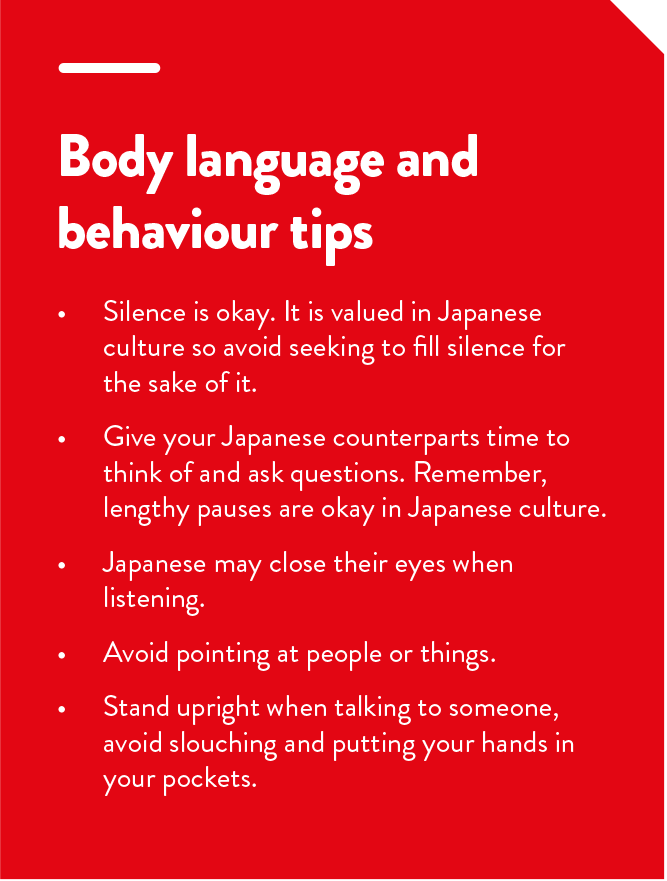
For more information, access the full Japan Country Starter Pack
You successfully shared the app
https://japancsp.shareableapps.com/
Tap and hold link above to copy to clipboard.
Are you sure you want to delete this message?
Information exchange: Japanese see meetings as information-gathering opportunities, not forums for making decisions. Therefore, do not expect changes in position or concessions during a meeting. Your Japanese counterparts will attend meetings as a group and engage as a group. Decisions will occur between meetings and in consultation with more senior decision makers, possibly at head office.
Order of business: After the exchange of business cards, your Japanese counterparts will listen to your presentation while taking notes and follow up with a few questions. The Japanese side will likely leave at this point. Do not misinterpret the formality of the meeting negatively. If it goes well, a follow-up meeting will be arranged.
Following up: After an initial meeting with a company, expect multiple follow-up meetings before a decision is made. These will likely be with different people each time – an important act of consensus seeking in the Japanese business decision-making process.
Communication: Japanese business people rely on indirect communication and may be reluctant to say 'no' if they are not interested in your service or product. They are more likely to say 'that may be difficult' or 'we will see' to convey a negative response. A direct refusal will be seen as a loss of face for you. To find out what your Japanese counterpart really thinks, it may be useful to go through third parties and informal channels.
Negotiation: Negotiating is a delicate process in Japan and aggressive tactics are unlikely to be successful. There is only minimal negotiation on price, so your first bid should be close to your best price. Japanese business people are likely to come to the table with their best offer.
Decision making: Be patient with the Japanese decision-making process. They are unlikely to be rushed into a decision and trying to force this may have negative consequences. However, things can move fast once a decision is made.
Contracts: The Japanese have a similar though slightly more flexible attitude towards contracts compared to Australians. The terms are taken seriously, although there is room to renegotiate them at a later date. Verbal contracts are much more common in Japan than in Western countries.
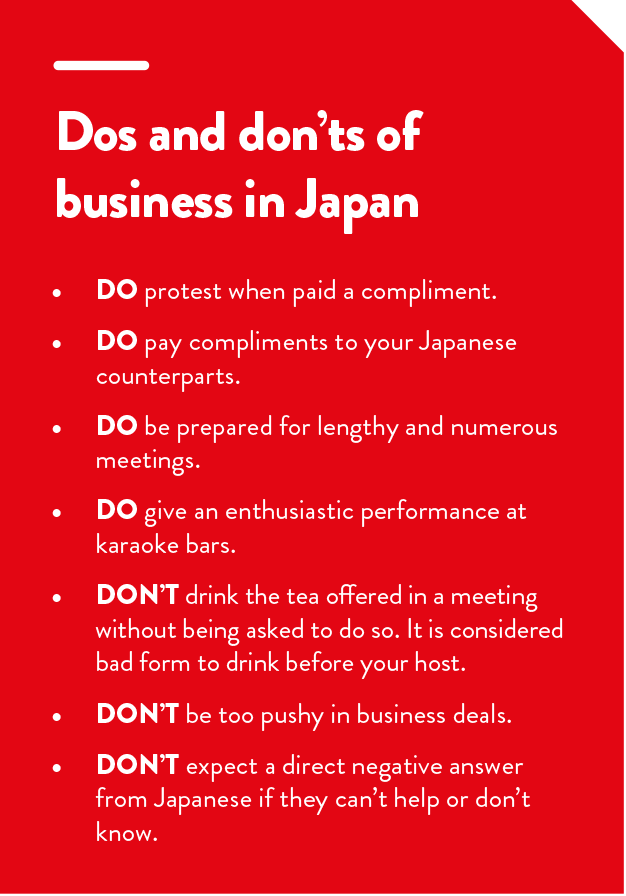
For more information, access the full Japan Country Starter Pack
You successfully shared the app
https://japancsp.shareableapps.com/
Tap and hold link above to copy to clipboard.
Are you sure you want to delete this message?
You successfully shared the app
https://japancsp.shareableapps.com/
Tap and hold link above to copy to clipboard.
Are you sure you want to delete this message?
Foreign investment in Japan is governed by the Foreign Exchange and Foreign Trade Act (FEFTA). The Ministry of Finance (MoF) and the Ministry of Economy, Trade and Industry (METI) are primarily responsible for enforcing the act.
Restrictions and prohibitions on foreign investment: Japan has relatively few restrictions on inbound foreign direct investment. However, some sectors of the economy, including broadcasting, are subject to tighter regulation than others. And for investment in the following sectors, prior notification of at least six months must be given to the Bank of Japan:
Under the FEFTA, the Government may reject an application for foreign investment in these sectors if it is deemed to 'undermine national security, disrupt public order, impinge on public safety and seriously affect the smooth operation of the national economy'.
Government policies for investment promotion: Increasing foreign direct investment in Japan is a stated aim of the Government as it tries to reinvigorate the economy. Significant incentives are on offer for prospective foreign investors, including tax deductions for R&D activity and reduced rents, particularly in designated special economic zones. For more information on the incentives available for foreign investment into Japan, visit the JETRO website.
There are no restrictions on foreign investors purchasing real estate in Japan, except that the Ministry of Finance must be informed within 20 days of the purchase. Certain exemptions may apply.
The Japan Patent Office administers all applications for trademarks, designs and patents. The trademark system, established under the Trademark Act, provides for the protection of the marks and logos used in commercially traded goods and services. The protection of designs – including the shape, pattern, colour and other characteristics – is regulated by the Design Act, and the Patent Act covers patents.
Trademarks are registered under the first-to-file rule. They do not have to be currently in use (either in Japan or overseas) in order to be registered in Japan; if the trademark owner has the intention of using the trademark in the future, it can be registered in Japan as long as certain criteria are met.
Plant varieties, copyright and trade secrets are protected as non-registrable rights in Japan.
For more information, access the full Japan Country Starter Pack
You successfully shared the app
https://japancsp.shareableapps.com/
Tap and hold link above to copy to clipboard.
Are you sure you want to delete this message?
When exporting to Japan, Australian businesses need to be aware of the various import regulations and tariffs and duties that may apply to their goods. Like foreign investment into Japan, trade is covered by the FEFTA. Japan Customs, which is part of MoF, enforces trade regulations and collects tariffs and duties on behalf of the Government. METI is responsible for enforcing quotas.
For imports valued greater than JPY 10,000 (AUD 124), an average customs duty of 3 per cent is levied by Japan. However, import levies and duties can be much higher on selected items, particularly agricultural products. Thanks to the recently signed Japan Australia Economic Partnership Agreement (JAEPA), import charges on Australian agriculture products are being progressively reduced over a number of years. For duty rates on specific products, visit the Japan Customs website at www.customs.go.jp
In recent years, Customs valuation audits have primarily focused on royalty payments, transfer pricing adjustments, and tangible and intangible assists provided free of charge or at reduced cost.
Once JAEPA is fully implemented, more than 97 per cent of Australia's merchandise exports to Japan will receive either preferential access or enter duty free.
To further explore the potential benefits of JAEPA for Australian businesses, check out the FTA Tool developed by the Export Council of Australia:
ftatool.com.au
To benefit from the provisions and preferential rates in JAEPA, Japanese and Australian goods need to comply with rules of origin (ROO) designed to prevent trans-shipment, where goods from a third party are redirected through either Japan or Australia to avoid paying higher tariffs. The Australian Chamber of Commerce and Industry (ACCI) is authorised by the Australian Government to issue Certificates of Origin. For more information, visit the ACCI website: www.acci.asn.au
Import licensing may be required for some types of products. Two categories exist:
Import quotas: These impose specific limits on the volume of a product that may be imported into Japan. They are set by the METI and range from moderate to severely restrictive. Quotas are imposed on a variety of foods including some dairy products, seafood, cereals and grains. After obtaining an import quota allocation certificate from METI, the importer must then acquire an import licence on application to a foreign exchange bank.
Import declarations: These allow a wide range of raw materials, semi-finished products and manufactured goods to be imported without prior approval from METI.
Goods that may have negative impacts on Japanese industry, economy and society face import restrictions. The import of items such as firearms, explosives and narcotics is prohibited. Some pharmaceuticals, medical products, chemicals and agricultural products also face restrictions.
For more information, access the full Japan Country Starter Pack
You successfully shared the app
https://japancsp.shareableapps.com/
Tap and hold link above to copy to clipboard.
Are you sure you want to delete this message?
Japan's taxation system includes a wide range of imposts on businesses and individuals applied at both national and local levels. The main imposts are income taxes (corporate income tax, local income tax and individual income tax) and turnover taxes (including value added tax, excise tax, surtax and acquisition tax).
The print and online versions of the Japan Country Starter Pack provide an overview of the primary taxes Australian enterprises need to consider when establishing a business in Japan, but they should seek professional advice on their business and its specific situation.
A Japan branch of a foreign corporation must use the same accounting period that is adopted by the corporation in its home country. Corporate income tax returns (which include the national corporation tax return, enterprise tax return, and local inhabitants' tax return) are self-assessed.
Japanese corporations are subject to Japanese corporate income taxes on their worldwide income. However, to avoid double taxation of foreign-source income, they can claim a tax credit against corporation and inhabitant's taxes for some tax paid outside of Japan.
For more information, access the full Japan Country Starter Pack
You successfully shared the app
https://japancsp.shareableapps.com/
Tap and hold link above to copy to clipboard.
Are you sure you want to delete this message?
Business entities generally follow the accrual basis of accounting. All income realised and expenses incurred or attributable to the current period should be recognised as income or expenses in the current period regardless of when the income is received or expenses are paid.
Financial statements must be prepared in accordance with generally accepted accounting principles. In Japan, the most commonly used standard is Japan Generally Accepted Accounting Practices (J-GAAP), established by the Accounting Standards Board of Japan. Public companies that meet certain criteria are allowed to prepare financial statements in accordance with the International Financial Reporting Standards (IFRS) and International Accounting Standards (IAS).
Corporate tax audits are usually performed in cycles of three to five years. However, this period may be shortened if significant issues were discovered in the prior audit. If taxpayers request a downward correction of their tax liability, an audit will be performed for confirmation.
Accounting records and important documents related to the company's operations are normally required to be retained for 10 years. Records can be kept in either Japanese or English, but the currency of record must be Japanese yen.
The accounting period in Japan is one year. Companies select the fiscal year that is declared in their articles of incorporation. A branch office must use the same accounting period as the head office in its home country. Tax returns must be filed within two months of the end of a company's fiscal year.
For more information, access the full Japan Country Starter Pack
You successfully shared the app
https://japancsp.shareableapps.com/
Tap and hold link above to copy to clipboard.
Are you sure you want to delete this message?
Japan has a highly educated, literate and skilled labour force. Even though Japan has experienced low economic growth for more than two decades, the unemployment rate has stayed low at around 3 per cent. However, low female participation rates, youth unemployment and skills mismatch are ongoing issues. Long hours and excessive overtime have also been identified as issues, with Japanese workers spending on average 1735 hours a year at work – one of the highest figures in the OECD.
Employment generally exists in three categories, each with different rights and responsibilities:
Haken or 'dispatch workers' are increasingly used by companies in Japan. Similar to temporary workers (or 'temps') in Australia, haken are employed by staffing agencies and take on assignments at other companies.
Labour shortages exist in some types of work roles perceived by the Japanese to be relatively undesirable, and described colloquially as '3k' – kitanai (dirty), kiken (dangerous) and kitsui (demanding). Increasing numbers of foreign workers from countries such as the Philippines and Vietnam are being brought in to fill these roles.
The Labour Standards Act sets minimum employment conditions, from wages to workplace health and safety and contract conditions.
Under the law, work rules covering working hours and wages, as well as conditions that employees must comply with, must be drawn up and submitted to the local Labour Standards Inspection Office by employers with 10 or more regular employees. Companies with fewer than 10 workers are also encouraged to draw up work rules. Where work rules are established, they have the same legal force as labour contracts.
Leave: Employees who have worked for six consecutive months from the time of hiring are entitled to paid leave. The annual entitlement increases with length of service.
Overtime: Overtime must be paid to employees who work in excess of ordinary hours, on days off or late at night.
Termination of employment: Japanese labour law makes it difficult to terminate full-time, regular employees. An employer must provide a suitable cause. Termination of employment has to be 'reasonable' and 'socially acceptable', which are difficult conditions to meet. Employees can be let go if a company is enduring significant difficulties and is restructuring. At least 30 days' notice must be given when terminating employment.
Minimum wage: The average minimum wage in Japan is JPY 798 per hour. The minimum wage varies between prefectures, although some industries, including manufacturing, have a national minimal wage.
Unions and collective bargaining: Japanese workers' rights to form and join unions are protected by law in the Trade Union Act. Enterprise unions, in which membership is based on working for a company or at a specific location, rather than being part of a profession or industry, are the most common forms of unions in Japan. As a result, unions tend to have closer relationships with management than elsewhere. Union membership in Japan currently stands at about 17.5 per cent of the workforce, a slight decrease on previous years.
Foreign workers can be sponsored by employers to work in Japan. A permit to work in Japan may be issued to some categories of skilled employee if certain conditions are met. Details of these conditions can be found here.
Be accessible: Managers in Japanese workplaces are expected to be accessible and willing to share knowledge with subordinates. In return, team members are expected to keep the manager fully informed. Instructions from Japanese managers can be quite vague when compared to the way Western managers communicate.
Be patient: Decision making can take longer in initial phases as consensus is sought from all those involved. The consensus-building process determines that agreement is sought before a formal meeting in order to avoid any direct confrontation. Once a decision is made, however, implementation times are generally quicker than in Western workplaces.
Praise the team: Teamwork and group membership is an important aspect of managing a Japanese team. Japanese culture is group oriented, and people derive a great deal of their identity from belonging to a group or team. Praise the team as a whole and do not single out individuals for praise, especially in public.
Communicate carefully: Communication in Japan tends to be indirect and often non-verbal. As a result, seeking opinions from Japanese team members can be difficult. To solicit ideas and opinions from your Japanese team, do not say what you think first and try using phrases like 'Do you have any advice for me?' or 'Do you see any difficulties with this?'
For more information, access the full Japan Country Starter Pack
You successfully shared the app
https://japancsp.shareableapps.com/
Tap and hold link above to copy to clipboard.
Are you sure you want to delete this message?
Japan's banking system is stable and well regulated, and offers many options for business and personal accounts. Some, but not all banks provide English-language services. However, the ATMs of major banks in Japan generally have an English option for basic services.
City banks (Toshi ginko) are the largest banks in Japan, providing domestic and international banking services. Banks in this category are Mizuho Bank, Sumitomo Mitsui Banking Corporation, the Bank of Tokyo-Mitsubishi UFJ and Resona Bank.
Regional banks and regional II banks (Chiho ginko) are smaller than the city banks and are headquartered in towns and cities other than Tokyo and Osaka. Their business is mainly in the prefectures where they are located. Regional II banks are smaller than regional banks, focusing on serving their immediate areas and smaller businesses. There are 64 regional banks and 41 regional II banks.
Trust banks (Shintaku ginko) are authorised to carry out business for trusts in addition to their normal banking business. They are unique among Japanese financial institutions in that they combine financing services with asset management services.
There are currently 53 foreign banks (Gaikoku ginko) operating in Japan. Australian banks operating in Japan include ANZ, Commonwealth Bank and National Australia Bank. All are located in Tokyo and offer a range of services mainly to institutional clients. ANZ and National Australia Bank also have branches in Osaka.
For more information, access the full Japan Country Starter Pack
You successfully shared the app
https://japancsp.shareableapps.com/
Tap and hold link above to copy to clipboard.
Are you sure you want to delete this message?
There are no limits on how much money can be transferred into or out of Japan. However, fees charged by banks to transfer money internationally can add up quickly.
Options to manage your exchange rate risk should be discussed with your bank. The international trade section of your bank's website will provide information about their exchange rate products.
If a foreign investor complies with all reporting and approval requirements, the Foreign Exchange and Foreign Trade Act guarantees the investor's right to repatriate income earned from the ownership of shares or equity interest, proceeds on disposal of such assets, principal and interest earned on long-term loan agreements, and payments received pursuant to technology licensing agreements. Repatriation methods include the sale of shares, receipt of dividends and other distributions, or a capital reduction.
For more information, access the full Japan Country Starter Pack
You successfully shared the app
https://japancsp.shareableapps.com/
Tap and hold link above to copy to clipboard.
Are you sure you want to delete this message?
You successfully shared the app
https://japancsp.shareableapps.com/
Tap and hold link above to copy to clipboard.
Are you sure you want to delete this message?
Australian passport holders entering Japan for periods of less than 90 days can travel without a visa – provided they do not undertake paid employment in Japan. Some business activities, such as making business contacts and attending meetings, are allowed with this form of entry. Those travelling without a visa are issued a Temporary Visitor entry stamp, which allows them to take inspection tours, attend conferences and meet with business contacts.
For more information, access the full Japan Country Starter Pack
You successfully shared the app
https://japancsp.shareableapps.com/
Tap and hold link above to copy to clipboard.
Are you sure you want to delete this message?
The principal unit of currency in Japan is the yen. It is the third-most-traded currency in the world after the American dollar and the euro. Major foreign currencies can be exchanged for JPY by banks and authorised money changers at airports and in major cities in Japan. Smaller food stalls may not accept credit cards, so carrying some cash is essential. Most taxis, restaurants and malls will accept credit cards.
For more information, access the full Japan Country Starter Pack
You successfully shared the app
https://japancsp.shareableapps.com/
Tap and hold link above to copy to clipboard.
Are you sure you want to delete this message?
Most Australians enter Japan via the principal international hubs of Narita International Airport, near Tokyo, and Kansai International Airport, near Osaka. Haneda Airport in Tokyo is also a likely entry point for international travellers.
Narita International Airport is about 60 kilometres from the centre of Tokyo. Most travellers use express trains or bus services to get into central Tokyo. Taxis are available, but are much more expensive than trains and buses. The road trip can take 45 minutes to two hours, depending on traffic, while express trains generally take less than an hour.
Kansai International Airport is about 40 kilometres from central Osaka. The airport is connected to major locations in Osaka via train or express shuttle bus service. An express train journey from Osaka Station to Kansai Airport takes approximately 65 minutes.
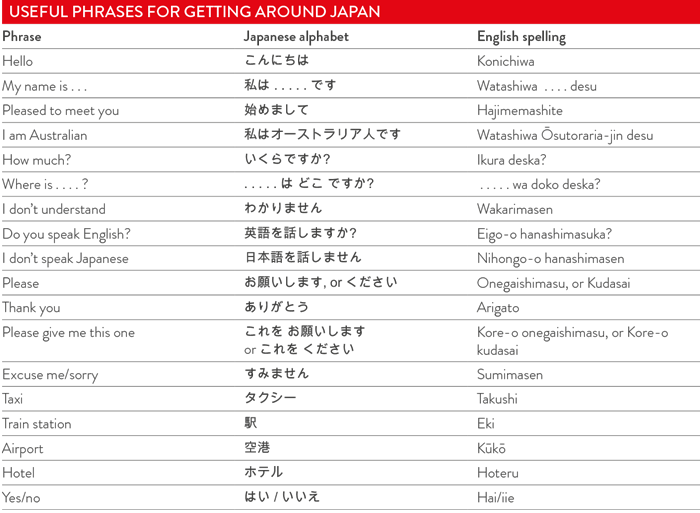
For more information, access the full Japan Country Starter Pack
You successfully shared the app
https://japancsp.shareableapps.com/
Tap and hold link above to copy to clipboard.
Are you sure you want to delete this message?
Japan's train networks are world-renowned for their efficiency and extensive coverage. The high-speed shinkansen (bullet train) network links most major cities. Slower trains provide dependable links to smaller rural cities, towns and villages. And for towns with no rail service, there are regular buses.
If you are planning multiple long-distance train journeys, a Japan Rail Pass will probably be your most cost-effective option. The pass, which must be bought from a travel agent in Australia before you go to Japan, provides unlimited travel for periods of one, two or three weeks on trains – including shinkansen – operated by any of the six Japan Railways (JR) companies.
You should consider air travel for longer domestic trips of about 800 kilometres or more – such as between Tokyo and Sapporo.
The metropolitan rail networks in Tokyo and Osaka are vast and operate fast, regular and reliable services – although they can be very crowded in peak times. Metered taxis are also everywhere in Japanese cities and towns. However, in major cities like Tokyo, rail is usually more reliable than road once traffic delays are factored in. Buses are very common in Japanese cities and in rural areas, generally serving shorter routes where trains don't go.
For more information, access the full Japan Country Starter Pack
You successfully shared the app
https://japancsp.shareableapps.com/
Tap and hold link above to copy to clipboard.
Are you sure you want to delete this message?
Japan caters for every level of business traveller, from low budget to luxury. International chains, including Shangri-La, Peninsula, Hyatt and Mandarin Oriental, have hotels in Japan's major cities. Travellers should try to pick a hotel based on where they expect their business meetings to take place.
The major business districts are Marunouchi, Roppongi, Shibuya and Shinjuku. All four of these districts are serviced by Japan's very efficient train and bus systems and taxis are plentiful.
Osaka is Japan's third-largest city and shares a sister-city relationship with Melbourne, Australia. The city is divided into downtown and uptown areas and some popular districts include Umeda, Namba, Shinsaibashi, Tennoji and Abenobashi.
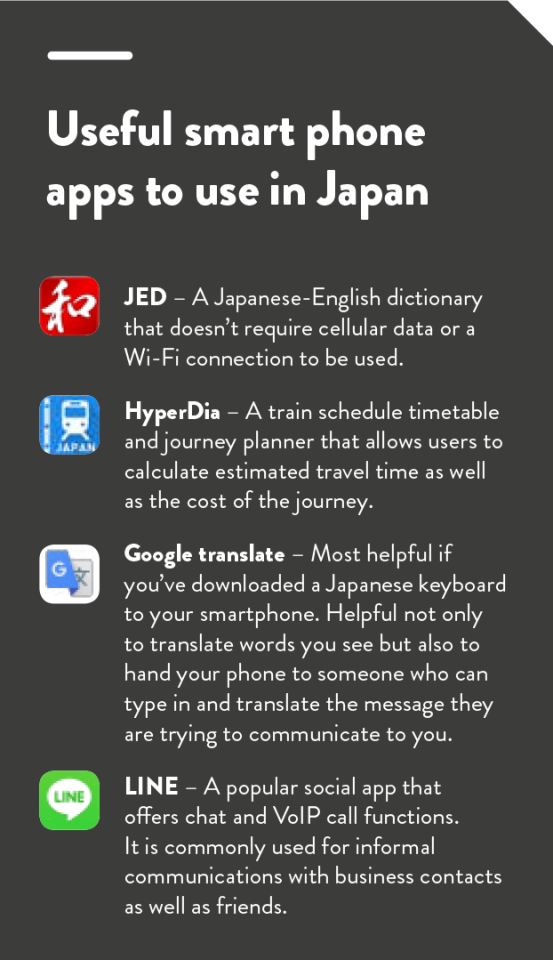
For more information, access the full Japan Country Starter Pack
You successfully shared the app
https://japancsp.shareableapps.com/
Tap and hold link above to copy to clipboard.
Are you sure you want to delete this message?
Some of the following information on health and welfare in Japan has been provided by Australia's Department of Foreign Affairs and Trade (DFAT) as general advice.
Japan is a relatively low-risk destination when it comes to your health. Advanced medical facilities can be found in all major Japanese cities, and many staff at the larger facilities speak English. The cost of medical treatment in Japan can be high, so travel insurance with medical cover is highly advisable.
Japan's reputation as a safe destination for foreign travellers is well deserved, but you should still be vigilant.
Some local laws and penalties in Japan are very different to those in Australia. Penalties for serious crimes include the death penalty.
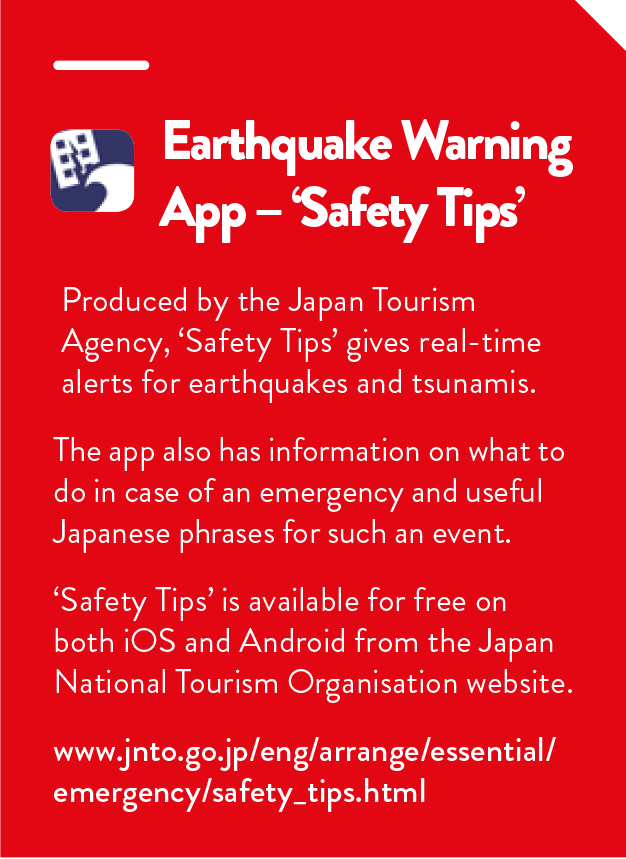
Japan is prone to volcanic activity, earthquakes and tsunamis. Minor quakes occur frequently throughout the country, but major incidents – such as Tohoku in 2011 and the Kobe earthquake of 1995 – are rare. Parts of Japan can also be buffeted by typhoons at some times of year.
The Japanese are well drilled on natural disaster preparation. Follow the advice of local authorities in the unlikely event that one occurs.
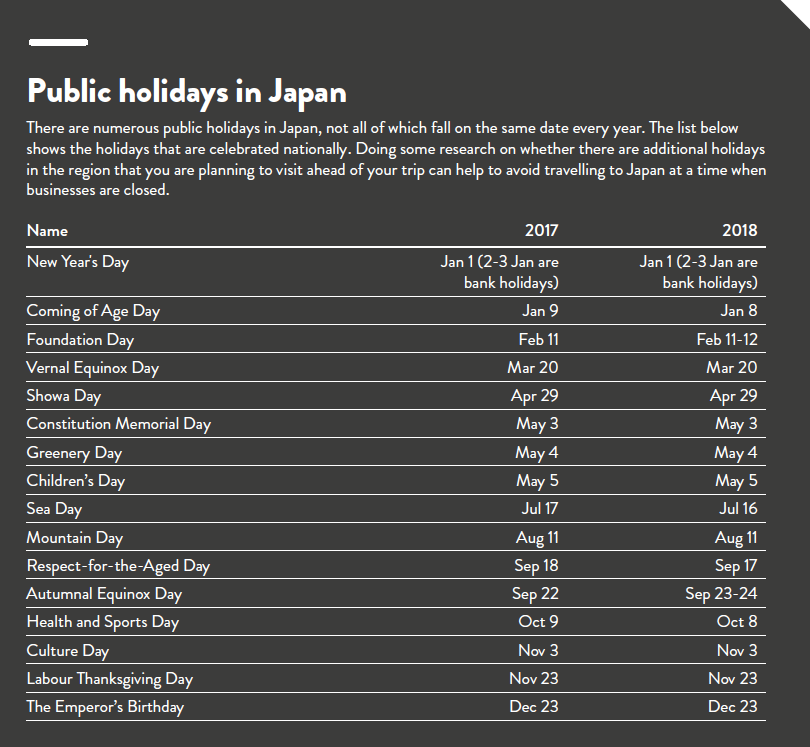
For more information, access the full Japan Country Starter Pack
You successfully shared the app
https://japancsp.shareableapps.com/
Tap and hold link above to copy to clipboard.
Are you sure you want to delete this message?

Asialink Business provides high-calibre opportunities for Australian businesses to build the Asia capability of their executives and team members. Our business-focused cultural competency programs, professional development opportunities and practical research products allow businesses to develop essential knowledge of contemporary Asian markets, business environments, cultures and political landscapes.
You successfully shared the app
https://japancsp.shareableapps.com/
Tap and hold link above to copy to clipboard.
Are you sure you want to delete this message?
You successfully shared the app
https://japancsp.shareableapps.com/
Tap and hold link above to copy to clipboard.
Are you sure you want to delete this message?
You successfully shared the app
https://japancsp.shareableapps.com/
Tap and hold link above to copy to clipboard.
Are you sure you want to delete this message?
You successfully shared the app
https://japancsp.shareableapps.com/
Tap and hold link above to copy to clipboard.
Are you sure you want to delete this message?
You successfully shared the app
https://japancsp.shareableapps.com/
Tap and hold link above to copy to clipboard.
Are you sure you want to delete this message?
You successfully shared the app
https://japancsp.shareableapps.com/
Tap and hold link above to copy to clipboard.
Are you sure you want to delete this message?

You successfully shared the app
https://japancsp.shareableapps.com/
Tap and hold link above to copy to clipboard.
Are you sure you want to delete this message?
This app requires Google Chrome to continue. Tap the icon, copy link, then paste into Chrome
This app requires Google Chrome to continue. Tap the icon, Open in browser, then choose Chrome
Japan CSP
| App category: | Other |
| Updated: | May 14, 2019 |
| App Publisher: | Asialink Business |
| Compatible with: | iOS 6+, Android 4+, Blackberry 10+ and Windows Phone 8+. |
| Legals: | Terms of use |
You successfully shared the app
You successfully shared the app
https://japancsp.shareableapps.com/
Tap and hold link above to copy to clipboard.
Are you sure you want to delete this message?
You successfully shared the app
https://japancsp.shareableapps.com/
Tap and hold link above to copy to clipboard.
Are you sure you want to delete this message?